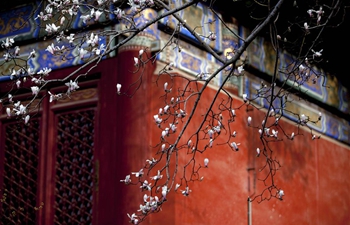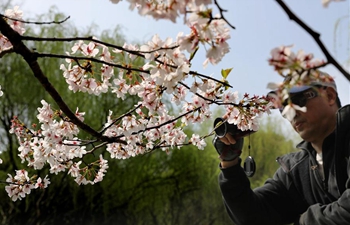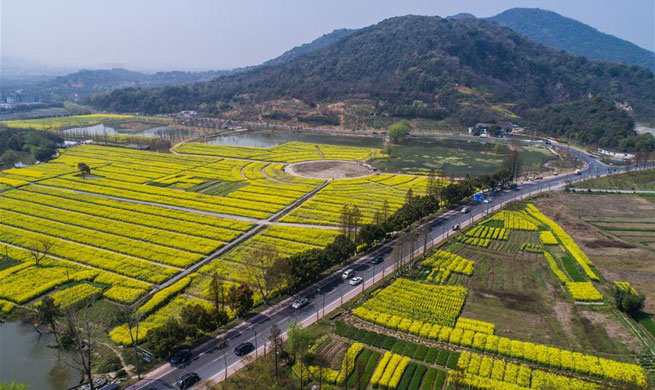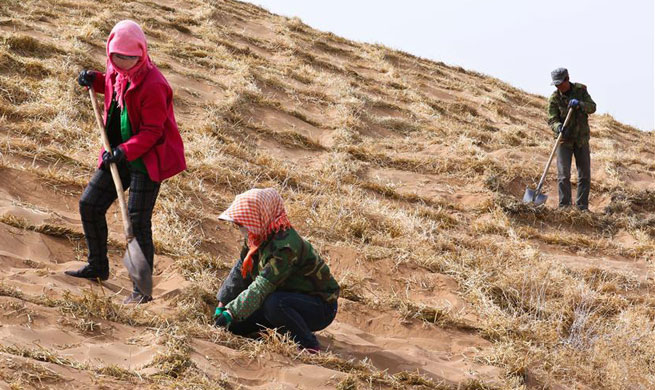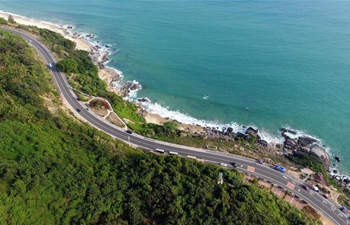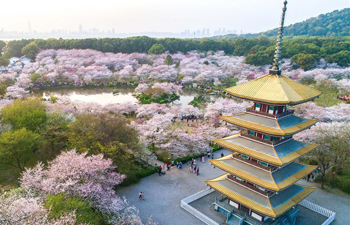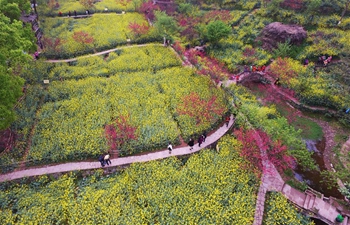ANKARA, March 27 (Xinhua) -- Turkish culinary culture is renowned as one of the world's best and is considered to be one of the three main cuisines of the world because of the variety of its recipes and flavors.
Recently the country's sweetest pride and joy, the baklava, made it to Guinness world records.
The world's largest baklava, a traditional pastry desert, was served at an exclusive gastronomy summit in the Turkish capital Ankara.
A 515 kilograms baklava was prepared by a team of baklava masters from around Turkey and was baked on a single tray in a special oven as part of a fair visited by tens of thousands of people in capital Ankara.
A Guinness official present through a live broadcast at the scene confirmed the record, the state-run Anadolu Agency reported.
Baklava, whose origin is disputed between Turkey and Greece, is prepared with fresh pistachios or walnuts and a glistening honey glaze on top of the puffed pastry.
Mehmet Kanbur, the CEO of MADO, one of the largest ice cream chains in the country, which sponsored the record attempt, said that the baklava has been made after three months of preparation work.
He said they sought to promote baklava internationally and that the dessert weighed two times heavier than the previous record holder.
With around 11,800 slices, the record-breaking baklava was baked in a tray that is 2.5 meters in width and 7.5 meters in length.
For five hours, 18 chefs worked making the dessert, using 150 kilograms of butter and 80 kilograms of walnuts.
Made of 35 or more layers of thin dough brushed with butter and sugar syrup, the dessert, with numerous shapes, sizes and flavors, is wildly popular both in Turkey and around the world.
Baklava is traditionally consumed on special days, from religious festivals to celebrations. Turks eat an average of 4.4 kilos of baklava per year, according to an association of baklava chefs.
"This a healthy treat, of course one should not abuse of it but the ingredients used in the baklava are all healthy ones. I think that the consumption can go up," said pastry chief and baklava maker Senol Hanci to Xinhua.
He explained in a proud manner, insisting that he is from the southeastern province of Gaziantep, famous for its pistachios and thus the baklava but also a vast range of culinary treats, such as kebabs, this baklava master indicated that making it "is a whole different business."
"When we want to become chefs, we are taught at a young age how to make baklava. And when we are able to make it in a proper fashion, only then we are recognized as a master," he noted.
Turkish Culture and Tourism Minister Numan Kurtulmus, who spoke at the opening ceremony of the event in Ankara, said that Turkey has tremendous potential and knowledge on food culture and can attract more tourists thanks to its rich cuisine.
He emphasized that the more Turkish cuisine is known internationally, the more chance Turkey has to attract tourists to the country who wish to learn more about the country's food and drinks.
"We need to bring this into the world tourism and make it a major source of interest for the world tourism," Kurtulmus pointed out, adding that Turkey would host 38 millions tourist in 2018.
According to study, gastronomy tourists spend 50 percent more than regular tourists.
And to make things work on a government level, a culinary tourism desk has been recently set within the Ministry of Culture and Tourism for the first time to promote this kind of tourism.
After experiencing a difficult time in 2016 due to terrorist attacks and internal and international political turmoil with countries such as Russia and Germany, who massively choose Turkey as a leisure destination, the tourism sector has seen a revival in 2017 and awaits a promising 2018 season.
While the "sun-sea-beach" trio is ever-so popular, Turkey intends to diversify opportunities, focusing on health, gastronomy and spa tourism, offering a variety of themes, especially for far eastern visitors who have different center of interest.
A Global Gastroeconomy Summit will be held in Istanbul, Turkey's economic heartland, on Thursday and participants are due to seek answers to the question whether gastronomy could offer to be a key to development and growth in a country.
With a very rich culture and traditions in food, Turkey is also promoting its natural products such as olive oil.
The Turkish baklava has been granted European Union protected status by the European Commission along with the Malatya region apricot and the Turkish dried fig from the Aydin region.
"There are other Turkish products who are waiting to be granted the protected designation of origin (PDO) as to be among the list of protected artisanal foods," said a European diplomat to Xinhua.
He noted that the diversity of the products offered have undergone a wide international recognition.







